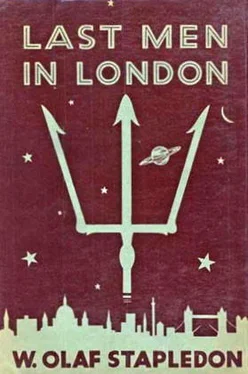On Neptune, then, there once lived, or from your point of view, there will live, a race of human beings which attained a certain aflluence and social complexity, but was ever hampered by its morbid interest in nutrition. By what freakish turns of fortune this state of affairs was brought about, I need not pause to describe. Suffice it that physiological changes had produced in this human species an exaggerated mechanism of hunger. This abnormality saddled all its members with a craving for food much in excess of biological need; and from the blundering social repression of this craving there arose a number of strange taboos and perversions. By the time this Neptunian species had attained civil life, the function of nutrition had become as perverse and malignant as the function of reproduction in your own society. No reference might be made to it in public, save to its excretory side, which was regarded as a rite of purification. Eating became a private and vaguely obscene act. While in many social situations sexual intercourse was a recognized means of expression and diversion, and even drinking was permitted in the less puritanical circles so long as it was performed through the nose, eating in the presence of another person was not tolerated. In every home a special privy was set aside for eating. This was stocked during the night by the public food carriers, who constituted the lowest caste of society. In place of your chastity ideal there arose a fiction that to refrain from eating was virtuous, and that the most holy persons could live without eating at all. Even ordinary folk, though pardoned for occasional indulgence, were supposed to refrain from the filthy act as far as possible. Repressed nutrition had by now coloured the Whole life of the race. The mouth occupied in its culture much the same position as the phallus with you. A vast and subtle symbolism, like that which in your culture is associated with the sacred and obscene reproductive act, was generated in this case by the sacred and obscene nutritive act. Eating became at once a sin and an epitome of the divine power; for in eating does not the living body gather into itself lifeless matter to organize it, vitalize it? The mouth was, of course, never exposed to view. The awful member was concealed behind a little modesty apron, which was worn below the nose. In prehistoric times the lips had formed the chief visual stimulus to sexual interest, and like the rump of the baboon had developed lavish coloration and turgescence. But very early in the cultural development of the species the modesty apron became universal. Even when the rest of the body was unclad, this garment was retained. And just as in your culture the notorious fig-leaf is vaguely suggestive of that which it conceals, so, in this Neptunian culture, the conventionally decorated covering of the mouth came to mimic furtively the dread orifice itself. Owing to the fact that in polite society no sound might be made which betrayed movement of the lips, speech became distorted and debased. One curious consequence of this obscenity of the mouth was the peculiar status of kissing. Though sexual promiscuity was almost universal, kissing was a deadly sin, except between man and wife. A kiss, bestowed in privacy and darkness, was the true consummation of marriage, and was something infinitely more desirable and more disturbing than the procreative act itself. All lovers longed to be united in a kiss; or, if they were innocents, they looked for some unknown fulfilment, which they vaguely and guiltily felt must be somehow connected with the mouth. Coitus they regarded merely as an innocent and peculiarly delightful caress; but the kiss was the dark, exquisite, sacred, mystically significant, forbidden fruit of all their loving. It was a mutual devouring, the act in which, symbolically, the lover took the substance of the other within his or her own system. Through this connexion with romantic love the kiss gathered to itself all that obscure significance of tender personal relations, of spiritual communion between highly developed personalities, which in your world the same romantic love may confer on coitus. Further, since, like your Trobriand Islanders, the less sophisticated races of this species were often ignorant of the connexion between the sexual act and conception, and since, as with those islanders, sexual intercourse outside the marriage bond often failed to produce offspring, it was commonly believed in the more primitive of these Neptunian societies that the true reproductive act was the kiss. Consequently conception and child-birth came to be endowed with the same mystery, sanctity, and obscenity as nutrition. Sex, on the other hand, remained delightfully uncontaminated. These traditions maintained their power even in civilized societies, which had long ago realized the truth about parenthood. Children were carefully instructed in the hygiene of sex, and encouraged to have blithe sexual relations as soon as they needed that form of expression. But in respect of nutrition they were left in disastrous ignorance. As infants they were suckled, but in strict seclusion. Later they were taken to the food-privy and fed; but they were trained never to mention food in public and of course never to expose their mouths. Obscure and terrifying hints were let fall about the disastrous effects of gustatory self-indulgence. They were told not to go to the privy more than once a day, and not to stay longer than necessary. From their companions they gathered much distorted information about eating; and they were likely to contract diverse kinds of nutritive perversion, such as chewing stones and earth, biting one another or themselves for the taste of blood. Often they contracted such a prurient mania of thumb-sucking, that mouth and thumb would fester. If they escaped these perversions, it was by means of ignorant licentiousness in the food-privy. In consequence of this they were prone to contract serious digestive disorders, which moreover, if discovered, inevitably brought them into contempt. In either case they incurred a shattering sense of guilt, and contracted by auto-suggestion many of the symptoms which rumour attributed to their vice. In maturity they were likely to become either secret gourmets or puritans.
The effect of introducing Paul to this remote world was beneficial in more ways than one. Not only did it lead him gradually to regard his own sexual nature with a new tolerance and a new detachment, so that his mind was no longer tethered to the stake of sex; it also gave him a considerable insight into the mentality of his elders, and opened his eyes precociously to the farcical aspect of his species. Of course, he did not seriously believe his visions. Or rather, as the alien world embodied itself with increasing detail in his mind, he could not entirely disbelieve it, but came to regard it as ‘over there’, instead of ‘here’ like his own world. I had, of course, made him picture the Neptunian species. He glimpsed its squat stone cities, thronged with nude and bulky caricatures of his own race. He saw their mouth-aprons, and their secret vices of nutrition. He saw also their frank sexual behaviour, and actually from the study of sex in that remote age and world he learned much about sex in his own race. Not only so, but he learned his first lesson in that general detachment from the purely Terrestrial values, which I needed to produce in him. He learned, too, to scrutinize all prized and all condemned things to discover whether they were prized or condemned for their own sakes or for some other reason. For instance, comparing his fantasy world with the normal world, he saw that sexual activity and nutritive activity were both valued in both worlds, but that in each world one of these activities had gathered a purely accidental and farcical significance. On the other hand, in both worlds, love, the passionate admiration of spirit for spirit, was a genuine experience which lent something of its glory here to sex, there to nutrition.
Читать дальше












